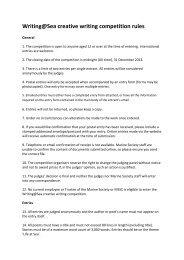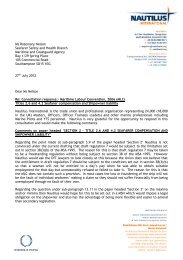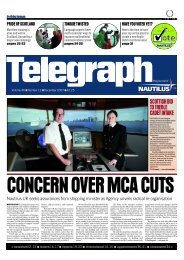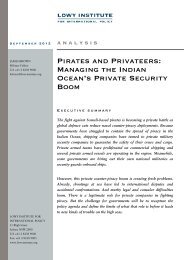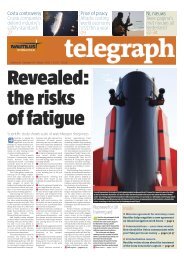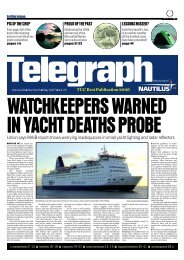NAUTILUS P01 OCTOBER 2010.qxd - Nautilus International
NAUTILUS P01 OCTOBER 2010.qxd - Nautilus International
NAUTILUS P01 OCTOBER 2010.qxd - Nautilus International
You also want an ePaper? Increase the reach of your titles
YUMPU automatically turns print PDFs into web optimized ePapers that Google loves.
30 | telegraph | nautilusint.org | October 2010<br />
MARITIME HISTORY<br />
Cadet became<br />
master writer<br />
John Masefield in his later years. He died in 1967, at the age of 89<br />
No.1<br />
Global<br />
<br />
<br />
<br />
Induction, advanced and familiarisation courses<br />
provider of<br />
Nautical Institute<br />
accredited DP courses*<br />
All instructors/consultants have at least 5 years DP operational<br />
experience<br />
Courses use Kongsberg and Converteam (formerly Alstom) DP<br />
hardware & software<br />
Training facilities conveniently located in London, Singapore,<br />
Philippines, Brazil (Macae) and Spilt, Croatia<br />
Onboard training and provision of expertise for DP operations<br />
DP trials and provision of expertise for DP operations<br />
DP trials and vessel audits<br />
Surveys and consultancy<br />
Technical Services covering FMEA’s and Audits etc to IMCA<br />
standards<br />
Consultancy services available worldwide offices in Marine<br />
centre’s London, Houston, Singapore and Spilt, Croatia<br />
From Merchant Navy trainee to Poet Laureate is quite some career path.<br />
Trevor Boult tells the story of the seafarer-turned-writer John Masefield…<br />
F<br />
John Masefield has been<br />
described as ‘A brightness<br />
not of this world’. To<br />
seafarers, and many former pupils<br />
of school-taught English, he will<br />
be largely remembered for two<br />
poems: Sea-Fever, and Cargoes.<br />
This is a testament to his talent,<br />
for these poems were amongst<br />
the earliest of his published writ-<br />
*Based on total number of students<br />
ings, which were to span a period<br />
of some seven decades.<br />
Masefield was able to pen<br />
such verses in his early 20s from<br />
the conviction and sensitivity of<br />
youthful personal experience —<br />
a potent quality openly acknowledged<br />
by the great writer of the<br />
seas, Joseph Conrad.<br />
His current reputation largely<br />
rests on these sea poems, but this<br />
obscures his wider<br />
achievements.<br />
He was as much<br />
a celebrant of<br />
the English countryside,<br />
was Poet<br />
Laureate for many<br />
years, and became e a<br />
best-selling author<br />
— publishing many<br />
volumes of verse,<br />
plays, novels, historical<br />
works and volumes<br />
for children.<br />
Yet Masefield was<br />
so much more than a<br />
writer. Regarded as a sea<br />
poet, his actual experiences<br />
of sea life were relatively<br />
short. But they were<br />
intense, and of a nature<br />
that quickly gave his ing undeniable and lasting<br />
writ-<br />
authority.<br />
F<br />
Born in Herefordshire<br />
in 1878, Masefield’s early<br />
years were spent in idyllic<br />
rural surroundings. Beyond<br />
the garden of the family home<br />
lay a reach of the Hereford and<br />
Gloucester Canal, then still active<br />
in the movement of coal. To the<br />
young lad the canal was one of the<br />
wonders of the world, the barges<br />
carrying ‘hearts of gold and<br />
cargoes of wonder, and always,<br />
always, returning a salute, even at<br />
a distance’.<br />
Water had a compelling attraction<br />
for Masefield, and the early<br />
experiences which meant most<br />
to him were those which occurred<br />
when he was alone amidst the<br />
beauty of nature.<br />
His mother was an able inventor<br />
of stories for her children, also<br />
delighting in poetry, and the first<br />
ever poem which moved young<br />
John he learnt by heart for her.<br />
Poignantly, it was Tennyson’s The<br />
Dying Swan.<br />
Before Masefield was seven<br />
years old, his mother succumbed<br />
to a fatal illness. Her<br />
son became ‘a<br />
swift, eager,<br />
gluttonous<br />
reader’, par-<br />
ticularlyo<br />
of<br />
exciting<br />
fiction.<br />
Such<br />
avid reading<br />
was to bear rich fruit, ling both his creative imagination<br />
fuel-<br />
and his innate abilities to retell<br />
out loud the stories he had read.<br />
Inspired by a godmother whose<br />
supportive influence shaped his<br />
ideas and tastes, these were the<br />
positive elements in Masefield’s<br />
life, which countered the grievous<br />
family loss and the increasing disruption<br />
to family life.<br />
John Masefield began life as a<br />
boarder at Warwick School before<br />
he was 10 years old and for the<br />
first time he committed verses<br />
to paper. ‘I was too young... and<br />
they found that I wrote poetry. I<br />
tried to kill myself once by eating<br />
laurel leaves but only gave myself<br />
a horrible headache.’ But he soon<br />
adapted and came to enjoy life at<br />
the school.<br />
After his father died, Masefield<br />
was taken under the guardianship<br />
of an uncle and aunt. Although<br />
this was considered a courageous<br />
and unselfish act of family loyalty,<br />
the aunt’s personality did not permit<br />
a happy atmosphere. To John,<br />
especially, she was brutally scathing.<br />
His artistic leanings were<br />
met with crushing disapproval,<br />
whilst his love of books aroused<br />
her scorn.<br />
To toughen him up, it was<br />
she who first<br />
suggested<br />
that he should<br />
be trained to<br />
go to sea. Such<br />
were the work-<br />
ings of fate<br />
that a callously<br />
motivated<br />
act<br />
should<br />
unwit-<br />
tingly combine<br />
with<br />
an inspir-<br />
ing<br />
account of<br />
life on<br />
the school<br />
ship HMS Conway,<br />
and<br />
John Mase-<br />
field scuppered his<br />
aunt’s intent in the<br />
onrush of his enthu-<br />
siasm to enrol.<br />
I<br />
F<br />
In common<br />
with<br />
other<br />
such school<br />
ships of the period, HMS Conway<br />
provided initial training and a certain<br />
amount of general education<br />
for boys wishing to become officers<br />
in the merchant service. The<br />
transition from sail to steam was<br />
well advanced at this time, but<br />
an apprenticeship in sail was still<br />
considered the best preparation<br />
for a career at sea.<br />
At this time the Conway was<br />
moored in the River Mersey.<br />
Masefield joined her when he was<br />
13. He was overawed by his first<br />
sight of the great port of Liverpool,<br />
but he had no inkling of ships or<br />
The Dynamic Positioning Centre is a leading<br />
provider of Training and Consultancy in the field<br />
of Dynamic Positioning.<br />
For further information about forthcoming<br />
DP training courses, please visit<br />
www.thedpcentre.com<br />
www.thedpcentre.com<br />
t +44 (0) 20 7407 3131<br />
e courses@thedpcentre.com<br />
Dirty British coaster with a salt-caked smoke stack,<br />
Butting through the Channel in the mad March days,<br />
With a cargo of Tyne coal,<br />
Road-rails, pig-lead,<br />
Firewood, iron-ware, and cheap tin trays.<br />
from Cargoes by John Masefield



